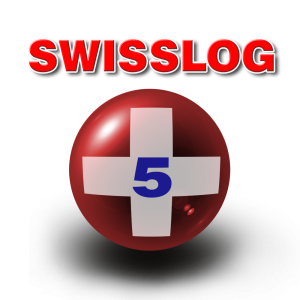SWISSLOG for Windows
a sophisticated logging program for Amateur Radio
( See under “Hamsoft” )
Swisslog is now completely free!
This version includes the following corrections/enhancements:
NEW: Added support for FLDIGI and MultiPSK. Please read “Digital modes Interfaces” in Swisslog Help.
NEW: Added support for CW Skimmer and enhanced code for CW interfaces. Please read “CW Interfaces” in Help.
NEW: Added OmniRig for transceiver control.
NEW: Now you can select a range of dates when uploading your logbook to Club Log. This is very useful in very large logbooks to split the uploads by periods. When selecting the option to upload from a range of dates, the “Clear existing log” is unchecked automatically to allow merging the selected QSO in your Club Log log. Otherwise your log in Club Log will only contain the selected QSO in the uploaded range. However user may choose to clear existing log if needed. The range of dates used will be saved so next time you open this function you know the last range of dates used.
NEW: You can now delete a single QSO in real time in Club Log if you have activated realtime logging. If you delete a QSO from the Add QSO function or any Logbook view it will be deleted in Club Log. IMPORTANT: if you delete more than one QSO from a logbook view these QSO won’t be deleted in Club Log. You have to upload a new full logbook with the “Clear existing log” option checked.
NEW: In dual monitor systems, apart from the DX messages and World Map windows, you can now move the following windows as standalone:
Add QSO
Logbook view
Register QSL cards
Select “Standalone Window” from the popup menu or the Functions main menu.
NEW: now when synchronising with LOTW the IOTA field will be automatically filled in Swisslog if the station has set this info in his LOTW profile. Very useful for IOTA hunters! I recommend a resynchronisation of your full logbook to get all missing IOTA.
NEW: Current Solar Flux Index (SFI) will be added automatically in the Comments field as “SFI: xx”. You must be connected to internet to read the SFI value. When importing ADIF files if the SFI field is found with a value different to 0 it will also be imported in the Comments field.
NEW: Added the following modes (supported by FLDIGI and MultiPSK): FSQ, IFKP, 8PSK, PSKR, QPSK250 and FSK250. FLDIGI and MultiPSK implements some other special modes that I have not implemented in the modes list:
MultiPSK: ASCII, LENTUS, ALE400, 141A (ALE) and all professional modes
FLDIGI: MFSK4,11,22,31,32,128,64L and 128L, QPSK500, FSK500 and FSK1000.
If using any of these modes user will have to manually select any similar QSO mode in Swisslog or add them in Edit | Add / Edit modes.
Updated: AGCW, ARLHS, BDM, DEE, DERESP, DIG, DMC, DME, DMVE, EPC, FOC, HSC, MF, NDG, RDA, SKCC, SOTA, TEN TEN, URE, WAIP, WCA and WFF statistics on 21/07/2016
Updated country table. THANK YOU VERY MUCH to Erik, EI4KF.
and many more……..
Complete list @






